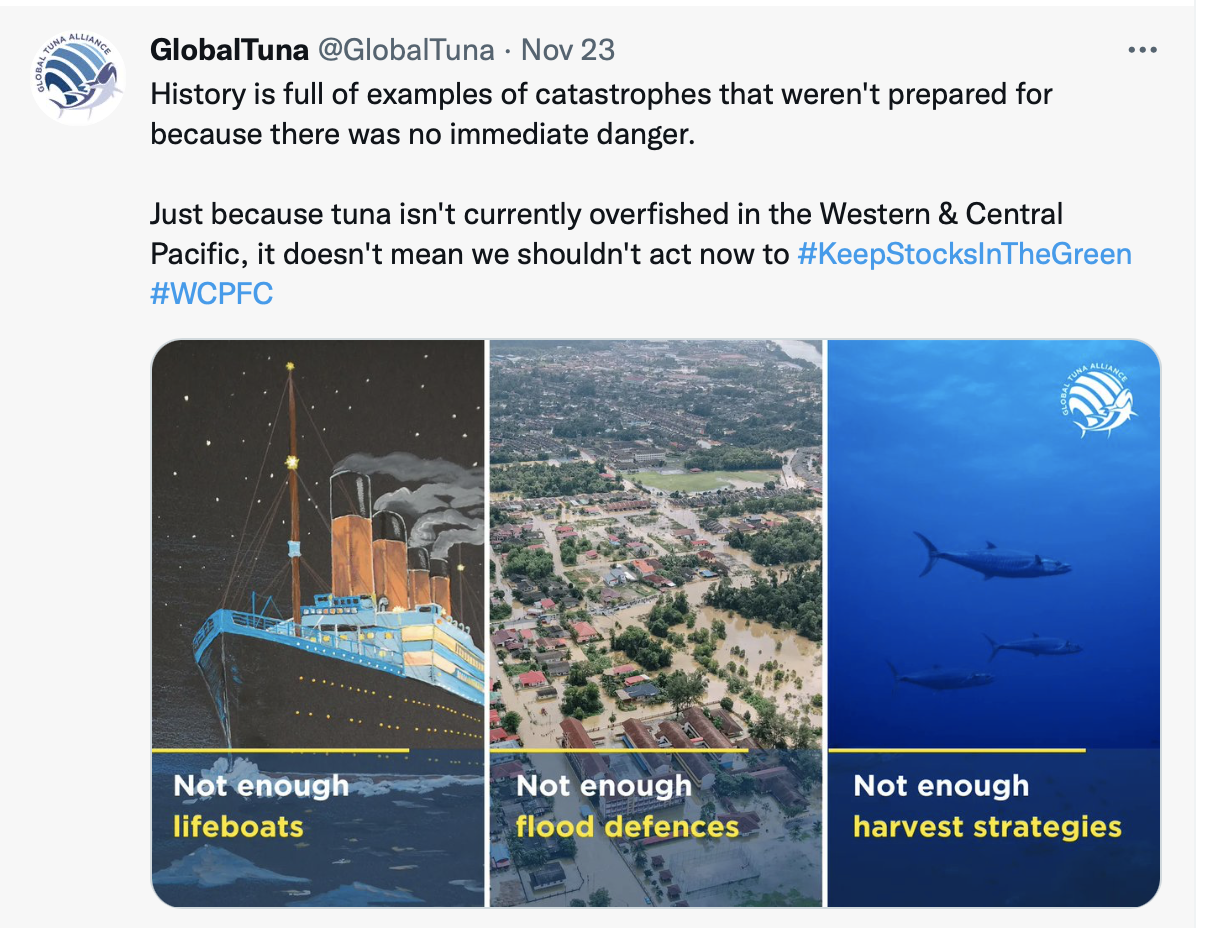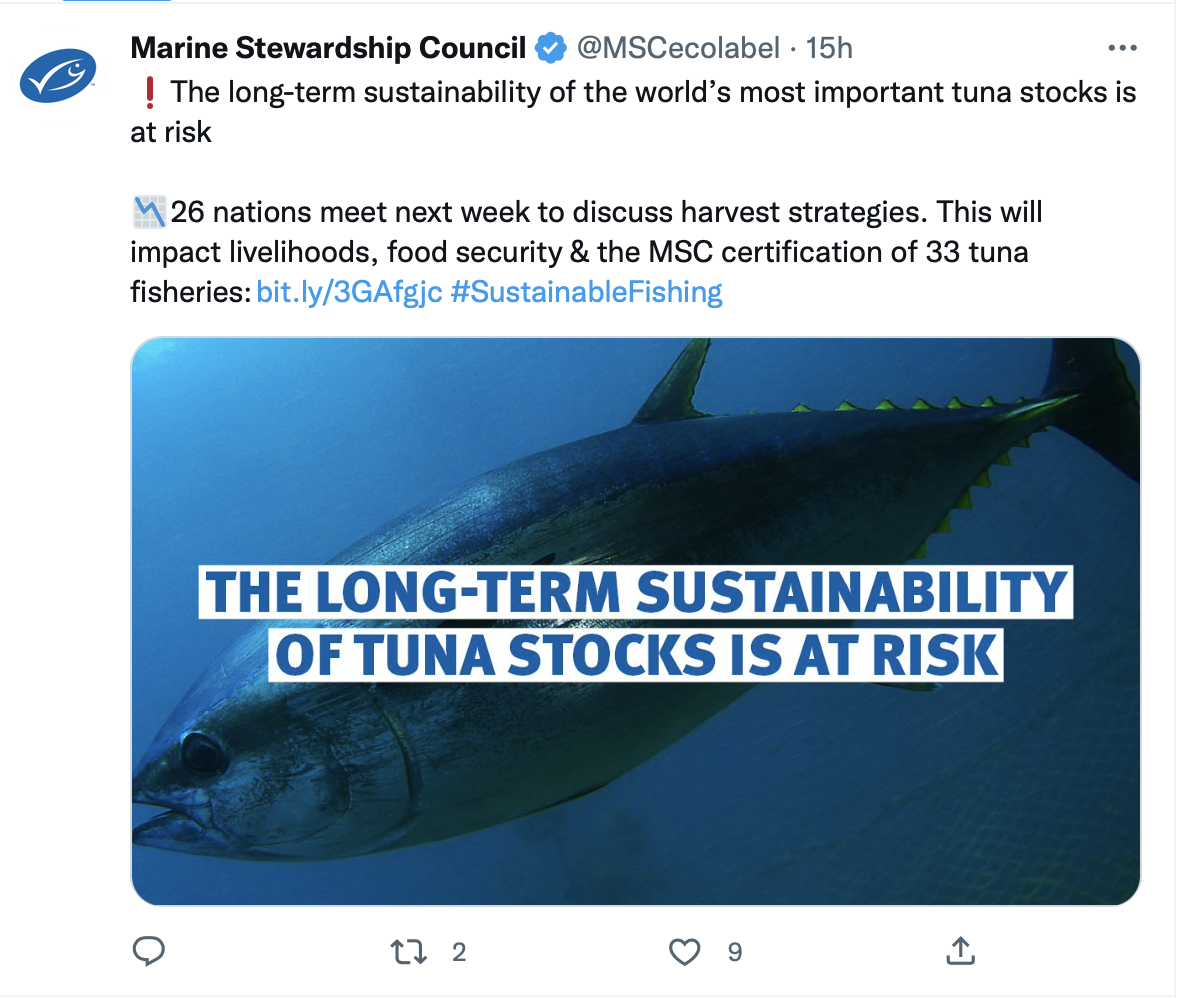Lots are being discussed and lobbied on the Harvest Strategies issues at the WCPFC. The Harvest Strategy approach remains one of the top priorities of WCPFC, and WCPFC 19 next week will have many discussions addressing different aspects of the Harvest Strategy of various stocks under the purview of the Commission. They also will also review the indicative work Plan, which has gone through multiple revisions over the last few years.
All the CCMs have had a series of meetings this year, including SC18 and Science-Management Dialogue on management procedures for skipjack tuna and South Pacific albacore. WCPFC 19 will have discussions based on the information from previous meetings with the view to adopting a management procedure for skipjack tuna. The progression of the South Pacific albacore harvest strategy has been slower than the skipjack one for many reasons that may not be popular among NGOs but are very valid.
So there are some NGOs campaigning to get it done, which is fair enough… yet while I support the position of NGOs as “opinion-holders’, I don't think they are more important than those of “stakeholders”… so when fingers are being pointed at FFA for moving cautiously on this (for the own valid reasons), I get irked and call neo-colonialism.
We see the reality every day from our offices in MIMRA; we literally see the fleet and their catches… so when their view is challenged by people on desks in big western capitals associated with interests around private certifications… I, as the “absolutely no one” I am (just a bloke that works with fisheries administrations and regional organisations)… I get pissed off.
Interestingly a very short quote from something is was asked a few months ago made it to an observer paper at the WCPFC meeting by the Ocean Foundation.
It said: “The WCPFC membership is taking the necessary steps to develop and adopt harvest strategies for the key WCPO stocks, recognising the role they have to play in effective Pacific fisheries management and ensuring sustainable development utilisation over the longer term.” And I stand to it…
Yet I quote below my full statements to them for context. And I wish the text in bold italics would have made it to that publication.
This is my testimonial concerning harvest strategies and their role in the effective fisheries management of Western Central Pacific Ocean tuna stocks.
I am a fisheries consultant with over 40+ years of career experience in fisheries in general and 30+ years of direct experience in Pacific fisheries. This experience spans from operating as a fisherman to being a specialist adviser to governmental and multilateral organizations and a country representative attending international fisheries forums, including at FFA, PNA and Western Central Pacific Commission meetings on an annual basis since 2017.
Harvest strategies are an effective management tool in domestic fisheries globally and have relatively recently been successfully implemented in several international fisheries. Although difficult and more complex (in a sense) to apply harvest strategies in international settings, they have a significant role in enabling efficient decision-making and more responsive fisheries management in an increasingly complex marine environment and global stage.
Harvest strategies are beneficial in that they define set biomass targets and thresholds that, when triggered, activate pre-approved management outcomes or actions. This helps traverse and speed up negotiations to achieve timely management decisions, which is better for the fish.
The Western Central Pacific Fisheries Commission has a role in adopting harvest strategies to effectively manage key species in the Pacific, such as yellowfin and bigeye tuna. The Commission has previously recognised the need for harvest strategies reflected in its Conservation Management Measure to develop and implement a harvest strategy approach for key fisheries and stocks in the WCPO (CMM 2014-06).
However, it is essential to recognise that the application of harvest strategies in the international arena is complex on many fronts. It takes time to get right as sometimes in the process of finding consensus, geopolitical interests can influence a science-driven decision process. Furthermore, it has to include the special requirements of developing countries, particularly the potential imposition of a disproportionate burden on SIDS. Nevertheless, I believe that, despite the difficulties, the WCPFC membership is taking the necessary steps to develop and adopt harvest strategies for the key WCPO stocks, recognising the role they have to play in effective Pacific fisheries management and ensuring sustainable development utilisation over the longer term.
I look forward to this year’s WCPFC meeting and further progress being made on this crucial front.
—-
now at a personal level…
the MSC pressure on getting the tropical tuna measure (TTM) and the Harvest strategy (HaSt) agreement in place at the WCPFC meeting, same as some NGOs are running a scaremongering campaign as you can see in the images below. I call a fully vested interest in that…
The tropical tuna measure (TTM) and the Harvest strategy (HaSt) agreement is perhaps the most complex issue faced at the WCPFC... is highly technical with a lot of moving parts of which harvest strategies are one... I just want to give a word of caution if you decide to tackle it, as is very easy to fall into holes and potentially antagonise parties. Is important to keep in mind that the WCPFC Harvest Strategy Workplan is delayed not because of a lack of dialogue and understanding of its importance of it, but mostly because the debate on harvest strategy elements has become a geopolitical tool used by some DWFN to influence future allocations and (of course!) entrench privilege.
As per the MSC angle, they have been publicising a lot… well... if there is no HaSt agreement, MSC will no doubt be the most affected in all of this... the reality is that they have more at stake and to lose than SIDS... if they were to suspend the certification of the key fishery that brings most of the volume under their logo they would lose a LOT of money...
Would they shoot their own foot based on a process that is delayed due to politics? Doubt it! They need the fishery more than the fishery needs them. A few years ago they were in a similar spot in terms of compartmentalisation around FADs... so they gave themselves time (3 years to suspend it) instead of suspending the fisheries because they are not sustainable!... and now looks like there is no need to suspend it because it looks like tuna fishing with FADs can be MSC certified.
The Tuna market depends on the WCPO catches... Do you think that if the tuna fisheries of the region were to lose MSC certification, all the canneries would go: Ahhh no... we not gonna can tuna anymore because is not MSC certified? of course not! They will keep going because people will keep eating tuna.
MSC is in a tight spot… under their new standards and the adjudication system changes are that if the HsSt and reference points are not agreed, they will need to (just because it is on paper, and not because the stocks ate at risk) take the certification out… if they do so… as say they lose their cash cow, and if they don’t they will be crucified by the NGO that oppose fisheries.
A lot is at stake, the setting of HaSt will be good for MSC, but that's not the primary purpose of the HsSt... the reason why MSC can certify the tuna fishery because it is managed sustainably by the SIDS and not the opposite… people should NEVER forget that.
Furthermore, while adopting a skipjack management procedure would look good on paper, the reality is that there are gaps and weaknesses in the current management framework, especially for the management of fishing on the high seas, which is less controlled and far less effectively monitored than fishing in national waters. It is going to be difficult to fully apply longer-term management arrangements until the weakness in high seas management is addressed
The stocks are healthy (as you can see here)... because FFA/PNA continues to manage and sustain their fishery against the raft of obligations they have signed onto at the pace that ensures their capacity is catered for and fits their purpose in short to medium term with the long term outlook for a regionally sustained fishery.
Tuna will not collapse next year if the WCPFC doesn’t agree this year to a heavily politicked issue needing more consensus.
Pointing fingers to FFA, PNA & SPC that have been working on this for a long time, ain’t fair.
I personally think the “scaremongering” driven by the MSC and some of their lobby groups are way more about their fear of losing money and their relevance in a world that is starting to see beyond their business model rather than the long-term SKJ sustainability and is actually quite colonial.


